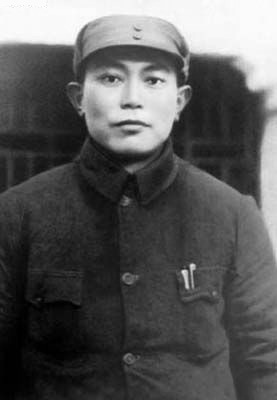|
Hong'an
Hong'an County (), formerly named Huang'an County (; Hwangan), located to the north of Wuhan, is a county in Huanggang, Hubei province, People's Republic of China. Hong'an is known as the "County of Generals" in that more than 200 (or 79 with the real rank, plus those who had a similar rank during or after Liberation War, making 223) Chinese army generals have been born there, a total far greater than for any other county in all of China. The former military leader and national President of China, Li Xiannian (1909–1992), was born in Hong'an. History In 845 BC Marquis Wen () Huang Meng () (aka Huang Zhang; ) moved the capital of the State of Huang from Yicheng to Huangchuan (present-day Huangchuan, Henan). Huang Xi's descendants ruled State of Huang until 648 BC when it was destroyed by the State of Chu. The Marquis of Huang, Marquis Mu () Huang Qisheng (), fled to the state of Qi. The people of Huang were forced to relocate to Chu. They settled in the region of present-day H ... [...More Info...] [...Related Items...] OR: [Wikipedia] [Google] [Baidu] |
Huanggang
Huanggang is a prefecture-level city in easternmost Hubei Province, China. It is situated to the north of the middle reaches of the Yangtze River and is bounded in the north by the Dabie Mountains and is named after Mount Huanggang. It borders Henan in the north, Anhui in the east and Jiangxi in the south. The city's administrative area covers and the total population was 5,882,719 as of the 2020 census whom 456,862 resided in the Huangzhou urban district, making it the second most populous city in the province by administrative population, after Wuhan, the provincial capital. the Ezhou – Huanggang built-up (or ''metro'') area was home to 1,152,559 inhabitants comprising (Echeng district and Huangzhou district of Huanggang), and many of its residents work in Wuhan. In 2007, the city is named China's top ten livable cities by Chinese Cities Brand Value Report, which was released at the 2007 Beijing Summit of China Cities Forum. History In 845 BC Marquis Wen () Huang Meng (; ... [...More Info...] [...Related Items...] OR: [Wikipedia] [Google] [Baidu] |
Li Xiannian
Li Xiannian (pronounced ; 23 June 1909 – 21 June 1992) was a Chinese Communist military and political leader, President of the People's Republic of China (''de jure'' head of state) from 1983 to 1988 under Paramount Leader Deng Xiaoping and then Chairman of the Chinese People's Political Consultative Conference from 1988 until his death. He was a full member of the Politburo from 1956 to 1987, and of its Standing Committee from 1977 to 1987.''Li Xiannian (1909–1992)'', in Christopher R. Lew, Edwin Pak-wah Leung: ''Historical Dictionary of the Chinese Civil War'', p.p. 120-121, Scarecrow Press, 2013Holley, David"Li Xiannian, Ex-President of China, Dies at 83: Old Guard: He was one of a ruling clique of ‘8 elders’ who ordered the army to repress the pro-democracy movement in 1989".''Los Angeles Times'', 23 June 1992. Li worked as an apprentice carpenter in his teenage years to support his family. He joined the Communist Party in December 1927 and became a soldier in th ... [...More Info...] [...Related Items...] OR: [Wikipedia] [Google] [Baidu] |
Hubei
Hubei (; ; alternately Hupeh) is a landlocked province of the People's Republic of China, and is part of the Central China region. The name of the province means "north of the lake", referring to its position north of Dongting Lake. The provincial capital, Wuhan, serves as a major transportation hub and the political, cultural, and economic hub of central China. Hubei's name is officially abbreviated to "" (), an ancient name associated with the eastern part of the province since the State of E of the Western Zhou dynasty of –771 BCE; a popular name for Hubei is "" () (suggested by that of the powerful State of Chu, which existed in the area during the Eastern Zhou dynasty of 770 – 256 BCE). Hubei borders the provinces of Henan to the north, Anhui to the east, Jiangxi to the southeast, Hunan to the south, Chongqing to the west, and Shaanxi to the northwest. The high-profile Three Gorges Dam is located at Yichang, in the west of the province. Hubei is the 7th-largest p ... [...More Info...] [...Related Items...] OR: [Wikipedia] [Google] [Baidu] |
Counties Of The People's Republic Of China
Counties ( zh, t=縣, s=县, hp=Xiàn), formally county-level divisions, are found in the Administrative divisions of China#County level, third level of the administrative hierarchy in Provinces of China, Provinces and Autonomous regions of China, Autonomous regions and the second level in Direct-controlled municipality#People's Republic of China, municipalities and Hainan, a level that is known as "county level" and also contains autonomous county, autonomous counties, county-level city, county-level cities, Banners of Inner Mongolia, banners, Banners of Inner Mongolia#Autonomous banner, autonomous banners and District (China)#City districts, City districts. There are 1,355 counties in Mainland China out of a total of 2,851 county-level divisions. The term ''xian'' is sometimes translated as "district" or "prefecture" when put in the context of History of China, Chinese history. History ''Xian'' have existed since the Warring States period and were set up nationwide by the ... [...More Info...] [...Related Items...] OR: [Wikipedia] [Google] [Baidu] |


.jpg)